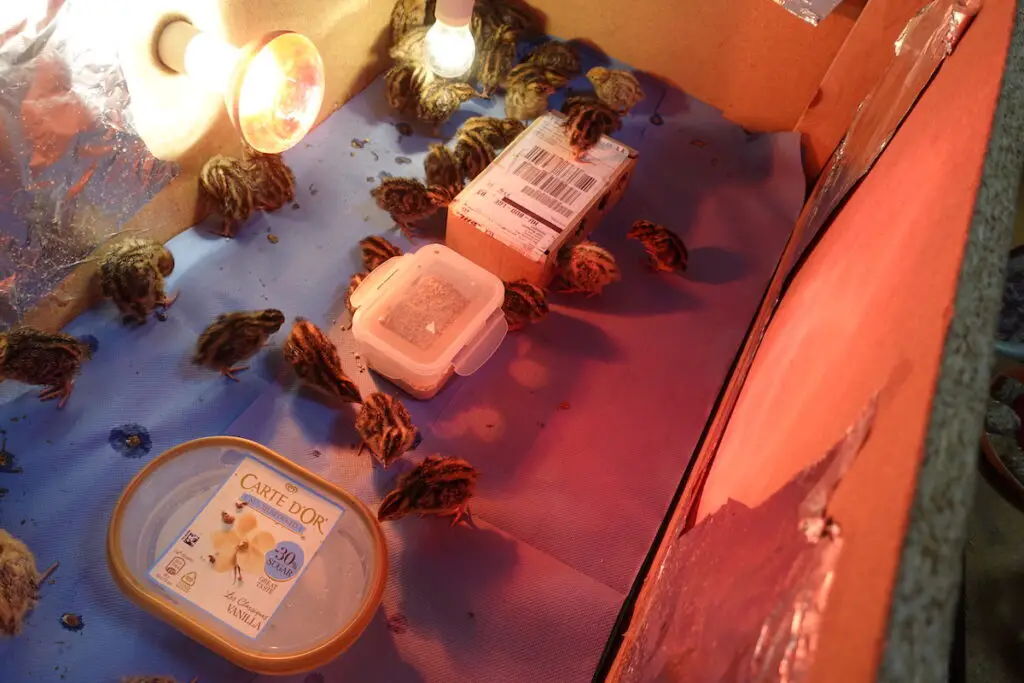If you are setting up a cage or coop for your quail, you may ask: Do Quail Need Sunlight?
The answer will certainly determine where you set up their home. The perfect spot needs to offer the optimum conditions for their health and well-being, as well as for laying eggs and breeding tasty meat.
Quail need light, which can be natural sunlight, a combination of artificial and natural sunlight, or solely artificial light. They need 14 hours of light per day for egg production. If kept outdoors without any supplemental light, their egg production will decrease during the winter season when the days are short.
Let’s look more closely at light and quail.
Learn how to raise your own quail and have an unlimited supply of eggs and meat.
Natural vs. artificial light
When it comes to keeping quail for meat and eggs, sunlight or artificial light are interchangeable. I haven’t read studies about natural light being more beneficial than artificial light, although common sense tells me that there are some benefits to natural light.
Having said that, I know many people who keep their birds indoors, and the only source of light is the lightbulb of the garage or of the barn, and still, they raise healthy quail.
I keep my quail in my home-made brooder box with artificial light in the first few weeks after hatching, and I move them outdoors to indirect sunlight. I don’t notice any difference in behavior and I find that they adapt to their new environment immediately.

More than the type of light, the quantity of light seems to be more important. You don’t want to keep your birds in complete darkness, and you also want to avoid them being exposed to light all the time. I found that my baby quail prefer the heat pad over the heat lamp because it allows them to keep warm even if I dim the light at night, and they don’t need to be exposed to harsh light all the time.
Light is essential
Light in the form of sunlight or artificial light is vital to keeping your quail healthy.
Biological rhythm regulation: Light helps regulate quail’s biological rhythms, including sleep-wake cycles, hormone production, and seasonal breeding. Quail actually sleep at night, and sometimes you can also see them fall asleep during the day.
Vitamin D production – Light allows quails to produce vitamin D in their skin, which is necessary for healthy bone development and function. Vitamin D helps with calcium metabolism. Females that are exposed to sunlight have higher levels of calcium and produce eggs with stronger shells. Calcium is also essential in the form of feed, so you should strive to give them a balanced diet.
Improved immune system – Light exposure stimulates the immune system in quails, helping them resist infections and diseases.
Nutrient absorption – Light helps absorb essential nutrients from the quail’s diet, ensuring they receive the required nutrients for optimal growth and health. A lack of light can weaken birds, as their bodies will not effectively absorb the necessary nutrients from the feed.
Stress reduction – Exposure to light has a calming effect on quails, reducing stress and promoting their overall well-being.
Feather maintenance – Light helps to keep quail feathers healthy and shiny, which is important to keep them warm.
Melatonin – Exposure to light helps regulate melatonin production, which is important for maintaining a healthy sleep-wake cycle and overall circadian rhythm.

Do quail like being in the sun?
Quail are diurnal birds, meaning they are active during the day and need sunlight or light for regular activities. In general, quails do like being in the sun and will often seek out sunny areas to bask in, but sunlight isn’t essential for them.
Even those quail kept outdoors need shade to cool down when they become too hot.
As with most things in life, a balance is needed. While quail do enjoy natural sunlight, too much sunlight can be detrimental to quail.
Excessive direct sunlight can cause these unwanted conditions:
Heat stress – This can lead to lower egg production and may reduce the quality of your quail eggs and meat. Quail suffering from heat stress will move their tongues up and down and breathe heavily. You will notice that they lack the energy to move and lose their appetites. Over-exposure to sunlight can cause your quail to die.
Dehydration – Too much sunlight can cause excessive water loss in quails, leading to life-threatening dehydration.
Sunburn – Quail can suffer from sunburn in the same way as humans. Sunburn can cause pain, discomfort, and skin damage.
Reduced egg production – Quail exposed to excessive sunlight may experience a decline in egg production, as it can disrupt their hormonal balance and reproductive cycle.
It is essential to provide quail with access to shade and fresh water during hot days to prevent them from suffering from the negative effects of excessive sunlight. You can also arrange to cover the coop during the day when it is exposed to direct sunlight. If this becomes a bind, consider repositioning your coop so that it doesn’t face directly into the sun.
How much light do quail need?
There’s no set amount of light quail need to thrive. They survive and can be maintained in good health on cold and short winter days without additional light just as well as on long sunny days.
However, as a general rule, 14 hours per day will ensure that egg production is at its peak and quail meat is at its tastiest. If you keep your quail outdoors like I do, you can have a light source installed, which you turn on (or comes on automatically) after dusk.
On our home farm, I supplement sunlight with artificial light, and I find that 14 hours is sufficient for quail to lay eggs. I have a light installed in their cage, and I turn it on at dusk for a couple of hours. It’s actually quite funny that they normally crow at dawn and dusk, but when I have the light turned on, they only crow when I turn off the light.
Even those quail that hatch in the winter and reach maturity on short winter days will start producing eggs if you give them sufficient supplemental light.
If you are breeding quail indoors, you can supplement artificial light with sunlight to achieve the same result.
What about light at night?
Like most creatures on the planet, quail need to sleep at night. Light at night will disrupt their sleep patterns and create unwanted behavioral issues that can even lead to agitation and birds pecking one another.
Without restful sleep, your quail’s health will suffer. Birds can become lethargic, stop eating, and egg production will suffer too. Don’t leave lights on all night in your quail coop. Installing a timer with your light is a great way to solve this problem, and you won’t need to remember to turn the lights on and off manually.
Installing light in the cage or coop
First, determine the best location for the light source within the coop. The quail should not be able to touch the lights. Install a sturdy mounting bracket to secure the light fixture. If possible, look for a waterproof light fixture and bulb to protect them from moisture in the coop. A timer switch can be installed to regulate the light cycles and provide consistent lighting.
Once installed, check the light fixtures regularly for any signs of damage or malfunction and replace them as needed.
If your quail have a combination of sunlight and artificial light, for morning and evening lighting, you don’t need super bright bulbs. You need to simulate light at sunrise or sunset and a 15W or 25W bulb will be perfect. Daylight can be simulated with brighter bulbs.
Final thoughts
Ensure that your quail get 14 hours of light per day. This can be a combination of natural sunlight, sunlight and artificial light, or only artificial light.
Quail will be happy in coops with sunlight or artificial light. Some larger quail farms only breed indoors using artificial light. If you have a backyard farm and have options, choosing an outdoor cage setting with natural sunlight works best because it is the closest to what quail have in their natural environment.
If they are outdoors, ensure that they can easily move to a shady area to avoid overheating. Don’t leave lights on in the coop overnight, as quail need to sleep.
Giving your quail the correct amount of light will ensure happy, healthy birds that lay quality eggs all year round.

